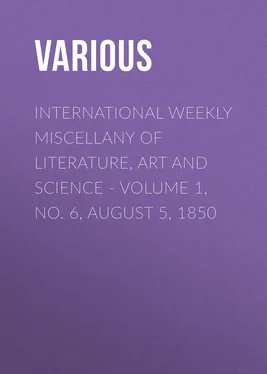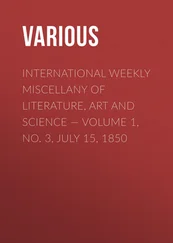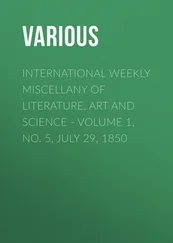Various - International Weekly Miscellany of Literature, Art and Science - Volume 1, No. 6, August 5, 1850
Здесь есть возможность читать онлайн «Various - International Weekly Miscellany of Literature, Art and Science - Volume 1, No. 6, August 5, 1850» — ознакомительный отрывок электронной книги совершенно бесплатно, а после прочтения отрывка купить полную версию. В некоторых случаях можно слушать аудио, скачать через торрент в формате fb2 и присутствует краткое содержание. Жанр: foreign_antique, periodic, foreign_edu, на английском языке. Описание произведения, (предисловие) а так же отзывы посетителей доступны на портале библиотеки ЛибКат.
- Название:International Weekly Miscellany of Literature, Art and Science - Volume 1, No. 6, August 5, 1850
- Автор:
- Жанр:
- Год:неизвестен
- ISBN:нет данных
- Рейтинг книги:3 / 5. Голосов: 1
-
Избранное:Добавить в избранное
- Отзывы:
-
Ваша оценка:
- 60
- 1
- 2
- 3
- 4
- 5
International Weekly Miscellany of Literature, Art and Science - Volume 1, No. 6, August 5, 1850: краткое содержание, описание и аннотация
Предлагаем к чтению аннотацию, описание, краткое содержание или предисловие (зависит от того, что написал сам автор книги «International Weekly Miscellany of Literature, Art and Science - Volume 1, No. 6, August 5, 1850»). Если вы не нашли необходимую информацию о книге — напишите в комментариях, мы постараемся отыскать её.
International Weekly Miscellany of Literature, Art and Science - Volume 1, No. 6, August 5, 1850 — читать онлайн ознакомительный отрывок
Ниже представлен текст книги, разбитый по страницам. Система сохранения места последней прочитанной страницы, позволяет с удобством читать онлайн бесплатно книгу «International Weekly Miscellany of Literature, Art and Science - Volume 1, No. 6, August 5, 1850», без необходимости каждый раз заново искать на чём Вы остановились. Поставьте закладку, и сможете в любой момент перейти на страницу, на которой закончили чтение.
Интервал:
Закладка:
"From what I have quoted, a general conception of the prose style of the authoress may be gathered. Her manner, however, is infinitely varied. It is always forcible—but I am not sure that it is always anything else, unless I say picturesque. It rather indicates than evinces scholarship. Perhaps only the scholastic, or, more properly, those accustomed to look narrowly at the structure of phrases, would be willing to acquit her of ignorance of grammar—would be willing to attribute her slovenliness to disregard of the shell in anxiety for the kernel; or to waywardness, or to affectation, or to blind reverence to Carlyle—would be able to detect, in her strange and continual inaccuracies, a capacity for the accurate.
"'I cannot sympathize with such an apprehension; the spectacle is capable to swallow up all such objects."
"It is fearful, too, to know, as you look, that whatever has been swallowed by the cataract, is like to rise suddenly to light."
"I took our mutual friends to see her."
"It was always obvious that they had nothing in common between them ."
"The Indian cannot be looked at truly except by a poetic eye."
"McKenny's Tour to the Lakes gives some facts not to be met with elsewhere."
"There is that mixture of culture and rudeness in the aspect of things as gives a feeling of freedom," etc., etc.
"These are merely a few, a very few instances, taken at random from among a multitude of willful murders committed by Miss Fuller on the American of President Polk. She uses, too, the word 'ignore,' a vulgarity adopted only of late days (and to no good purpose, since there is no necessity for it) from the barbarisms of the law, and makes no scruple of giving the Yankee interpretation to the verbs 'witness' and 'realize,' to say nothing of 'use,' as in the sentence, 'I used to read a short time at night.' It will not do to say in defense of such words, that in such senses they may be found in certain dictionaries—in that of Bolles', for instance;— some kind of 'authority' may be found for any kind of vulgarity under the sun.
"In spite of these things, however and of her frequent unjustifiable Carlyleisms, (such as that of writing sentences which are no sentences, since, to be parsed, reference must be had to sentences preceding,) the style of Miss Fuller is one of the very best with which I am acquainted. In general effect, I know no style which surpasses it. It is singularly piquant, vivid, terse, bold, luminous—leaving details out of sight, it is everything that a style need be.
"I believe that Miss Fuller has written much poetry, although she has published little. That little is tainted with the affectation of the transcendentalists , (I used this term, of course, in the sense which the public of late days seem resolved to give it,) but is brimful of the poetic sentiment . Here, for example, is something in Coleridge's manner, of which the author of 'Genevieve' might have had no reason to be ashamed:—
A maiden sat beneath a tree;
Tear-bedewed her pale cheeks be,
And she sighed heavily.
From forth the wood into the light
A hunter strides with carol light
And a glance so bold and bright.
He careless stopped and eyed the maid;
'Why weepest thou?' he gently said;
'I love thee well, be not afraid.'
He takes her hand and leads her on—
She should have waited there alone,
For he was not her chosen one.
He leans her head upon his breast—
She knew 'twas not her home of rest,
But, ah! she had been sore distrest.
The sacred stars looked sadly down;
The parting moon appeared to frown,
To see thus dimmed the diamond crown.
Then from the thicket starts a deer—
The huntsman seizing on his spear
Cries, 'Maiden, wait thou for me here.'
She sees him vanish into night—
She starts from sleep in deep affright,
For it was not her own true knight.
Though but in dream Gunhilda failed—
Though but a fancied ill assailed—
Though she but fancied fault bewailed—
Yet thought of day makes dream of night;
She is not worthy of the knight;
The inmost altar burns not bright.
If loneliness thou canst not bear—
Cannot the dragon's venom dare—
Of the pure meed thou shouldst despair.
Now sadder that lone maiden sighs;
Far bitterer tears profane her eyes;
Crushed in the dust her heart's flower lies.'
"To show the evident carelessness with which this poem was constructed, I have italicized an identical rhyme (of about the same force in versification as an identical proposition in logic) and two grammatical improprieties. To lean is a neuter verb, and 'seizing on ' is not properly to be called a pleonasm, merely because it is—nothing at all. The concluding line is difficult of pronunciation through excess of consonants. I should have preferred, indeed, the ante-penultimate tristich as the finale of the poem.
"The supposition that the book of an author is a thing apart from the author's self, is, I think, ill-founded. The soul is a cipher, in the sense of a cryptograph; and the shorter a cryptograph is, the more difficulty there is in its comprehension—at a certain point of brevity it would bid defiance to an army of Champollions. And thus he who has written very little, may in that little either conceal his spirit or convey quite an erroneous idea of it—of his acquirements, talents, temper, manner, tenor and depth (or shallowness) of thought—in a word of his character, of himself. But this is impossible with him who has written much. Of such a person we get, from his books, not merely a just, but the most just representation. Bulwer, the individual, personal man, in a green velvet waistcoat and amber gloves, is not by any means the veritable Sir Edward Lytton, who is discoverable only in 'Ernest Maltravers,' where his soul is deliberately and nakedly set forth. And who would ever know Dickens by looking at him or talking with him, or doing anything with him except reading his 'Curiosity Shop?' What poet, in especial, but must feel at least the better portion of himself more fairly represented in even his commonest sonnet, (earnestly written,) than in his most elaborate or most intimate personalities?
"I put all this as a general proposition, to which Miss Fuller affords a marked exception—to this extent, that her personal character and her printed book are merely one and the same thing. We get access to her soul as directly from the one as from the other—no more readily from this than from that—easily from either. Her acts are bookish, and her books are less thoughts than acts. Her literary and her conversational manner are identical. Here is a passage from her 'Summer on the Lakes:'—
"'The rapids enchanted me far beyond what I expected; they are so swift that they cease to seem so—you can think only of their beauty . The fountain beyond the Moss Islands I discovered for myself, and thought it for some time an accidental beauty which it would not do to leave , lest I might never see it again. After I found it permanent , I returned many times to watch the play of its crest. In the little waterfall, beyond, Nature seems, as she often does, to have made a study for some larger design. She delights in this—a sketch within a sketch—a dream within a dream . Wherever we see it, the lines of the great buttress in the fragment of stone, the hues of the waterfall, copied in the flowers that star its bordering mosses, we are delighted ; for all the lineaments become fluent , and we mould the scene in congenial thought with its genius .'
Читать дальшеИнтервал:
Закладка:
Похожие книги на «International Weekly Miscellany of Literature, Art and Science - Volume 1, No. 6, August 5, 1850»
Представляем Вашему вниманию похожие книги на «International Weekly Miscellany of Literature, Art and Science - Volume 1, No. 6, August 5, 1850» списком для выбора. Мы отобрали схожую по названию и смыслу литературу в надежде предоставить читателям больше вариантов отыскать новые, интересные, ещё непрочитанные произведения.
Обсуждение, отзывы о книге «International Weekly Miscellany of Literature, Art and Science - Volume 1, No. 6, August 5, 1850» и просто собственные мнения читателей. Оставьте ваши комментарии, напишите, что Вы думаете о произведении, его смысле или главных героях. Укажите что конкретно понравилось, а что нет, и почему Вы так считаете.












